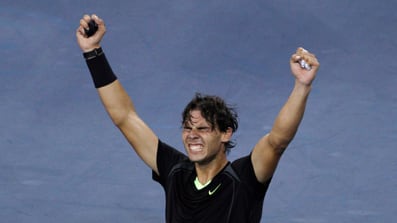With his convincing U.S. Open victory over Novak Djokovic, Rafael Nadal completed his career Grand Slam—and moved one step closer to Roger Federer. Joshua Robinson on Nadal’s scary-good career prospects.
From underneath the black headband that seems to squeeze his eyes closer together, Rafael Nadal’s dark gaze gave nothing away. Three and a half hours into his string-popping match against Novak Djokovic, he was playing harder and better than he had all night. The unforced errors were gone. The U.S. Open title—and history—were in his grasp. While Djokovic lost his cool, kicking out at loose balls and howling through the frame of his racket, Nadal’s fire raged just beneath the surface.
There was not a hint of emotion from him until the final point landed in. He fell onto his stomach, sprawled across the blue court, breathing deeply and quickly, almost sobbing without tears. For the crowd that had sat through a two-hour rain delay inside Arthur Ashe Stadium, it was the “I was there” moment they had come looking for. Even for the television audience, it was the stuff of classic highlight reels. But one man who didn’t watch was Roger Federer. Knowing that he would not have a chance to add to his record 16 Grand Slam titles, he had promised to ignore the final.

What he missed was the latest confirmation that Rafael Nadal is poised to be the next greatest player who ever lived. Federer’s time as the king of the sport is growing short.
• Joshua Robinson: Federer Breaks His Silence• Joshua Robinson: A Fairytale Win for Kim ClijstersNadal’s 6-4, 5-7, 6-4, 6-2 victory Monday night meant he has now won each of tennis’ four Grand Slam tournaments, a feat of consistency and versatility that has been achieved by only six other players. He also became the first man to win three consecutive Grand Slams since Rod Laver did it in 1969. So Nadal is in good company, at least for the time being. By the end of his career, it looks like he will stand alone.
“He’s getting better, that’s what is so frustrating,” said Djokovic, who fought gallantly but fell away in the latter stages of a close third set. “He has all the capabilities he needs to be the best ever.”
In a few whirlwind years, Nadal has grown from the defensive clay-court specialist with possibly suspect knees to a virtuoso on all surfaces. He has developed every facet of his game, beyond his trademark forehand. In the last year, he has revved up his serve by 10 miles per hour. But the defining point of his soaring career, the match that first proved he could go from great to greatest, came with his classic victory at Wimbledon in 2008. It was the first time Nadal had ever won a major away from the red courts of Paris and his first win over Federer in a Grand Slam final.
Comparing their career arcs, however, shows it was no surprise. Nadal picked up his first three Grand Slams before the age at which Federer, five years his senior, had a single one to his credit. By his 23rd birthday, with biceps blazing and long hair flowing, he’d claimed six—at that point in his career, Federer had three. Now, after his remarkable season and still eight months shy of his 25th birthday, Nadal has nine Grand Slams under his belt. When Federer turned 25, he’d won eight. Plus, Nadal can boast a David Cup title and an Olympic Singles gold medal, two distinctions that have eluded Federer.
Still, the shy, softly spoken Spaniard is always hesitant to discuss his place in the history of the game. For one, he believes it’s impossible to do without perspective. And more important, he just hates talking about it. Whenever those questions come, and they do with increasing regularity, he pulls an awkward grimace, as if to say, “This again?” Then his politeness kicks in and he indulges the reporters. To him, the question the tennis world loves to debate can be settled very quickly.
“Talk about who is better, Roger or me, is stupid because he has more titles,” Nadal said after collecting the trophy.
In the not too distant future, Federer may go from being a constant rival to another retired record holder. Though the Swiss master is only 29, has slipped from his once dizzying peak and is decidedly in the final phase of his career. He has said publicly that he wants to play through the 2012 Olympics. But if he called it quits after that, as many tennis writers expect him to, Nadal would be only 26 years old and without an obvious rival. (Players like Djokovic, Juan Martin del Potro, and Andy Murray have not yet proved consistent enough to challenge him at four majors a year.)
So even if he only played four years past Federer, assuming his body holds up, Nadal would have 16 opportunities to add to his Grand Slam tally. But the future, like history, is one of Nadal's least favorite topics. “It’s too far for me to think about,” he said. Which might make him the only person in the tennis world not wondering how many more there are to come.
Joshua Robinson is a freelance writer based in Manhattan. His work has appeared in the New York Times, the Wall Street Journal, the Washington Post, and Sports Illustrated.






